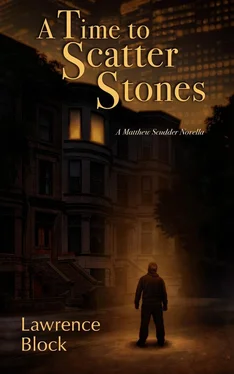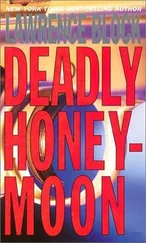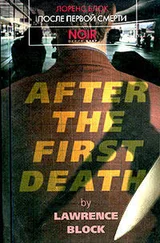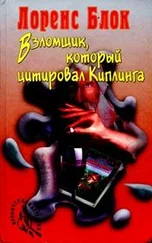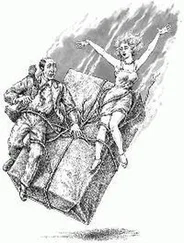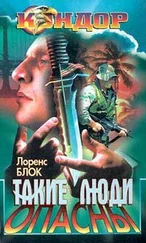“Her father.”
“Whatever. So a woman cop might be more sympathetic, but it’s not a given.”
She thought about it. Did I want a cup of tea? I didn’t, and she decided that neither did she. We hadn’t had lunch. Was I hungry? I said I wasn’t but she should go ahead, and she said she wasn’t all that hungry herself and it wouldn’t hurt her to miss a meal.
She said, “So what can we do if we can’t go to the cops? Say she’s a complete stranger and she comes up to your table at Armstrong’s and sits down and tells you her story. Then what?”
“Armstrong’s,” I said. “Jimmy died, what is it, fifteen years ago?”
“Is it that long?”
I did the math in my head. “Longer. Sixteen years. But I get the point. If I was still in business and she was a stranger, what would I do?” I answered my own question. “Probably walk her over to Midtown North,” I said, “and sit her down with Joe Durkin or somebody like him, and make sure they took her seriously.”
“You could have done that.”
“Back then, sure. Now if I want to sit her down next to Joe Durkin, I’d have to fly her to Florida. And that’s assuming he’s still alive.”
Mortality, never more than half a thought away.
I said, “Let’s stop trying to figure out what I would have done twenty years ago. What would I do now?”
“Well?”
“The first order of business,” I said, “is getting a name and an address for the son of a bitch.”
“Paul.”
“Paul whose name probably isn’t Paul. I’d want to know his name and where he lives. I wish I had a photo of him, something more than dark brown hair and the beginnings of a bald spot.”
“And if you did?”
“I’d show it around her neighborhood.”
“Which one? Curry Hill or West End Avenue?”
Curry Hill’s what they call those blocks in the East Twenties replete with inexpensive Indian restaurants. The name’s a play on Murray Hill, which begins a few blocks to the north.
“I was thinking 27th Street,” I said, “but I’d show it around her new neighborhood too, while I was at it. On the off-chance that he’d managed to track her that far.”
“So you’d go knock on doors.”
“Not these days,” I admitted. “These days I get tired thinking about it. I’d get somebody to do it.”
“Somebody like TJ?”
“If only,” I said.
TJ was a black street kid I’d met on Times Square, when a particularly nasty case had me checking out the peep shows and adult bookstores. He’d noticed me and figured I was looking for something, and figured too that he might turn a buck helping me find it. In not much time he became a part of my life — and eventually Elaine’s — and remained so for years.
He was somewhere between sidekick and assistant. I’d been living in a hotel at the time, and when I moved in with Elaine across the street at the Parc Vendome, I kept that room as an office. But I spent less and less time in that hotel room, and the day came when I gave it to TJ.
I don’t know where he lived before then. He kept a lot to himself.
I did some more mental math, and I said, “Do you know how old he is now?”
“No. But you’re gonna tell me, and it won’t make me happy.”
“He was probably fourteen when I met him. Wiser than his years, certainly, but chronologically something like fourteen or fifteen. He’s got to be forty now.”
“No. That’s impossible.”
“Thirty-nine, forty, forty-one. Somewhere in there.”
“Oh, I know you’re right. I just can’t get my mind around it. In my head he’ll be a boy forever. Remember his rhyming slang?”
“ ‘When we gone eat? ’Cause I be starvin’, Marvin.’ ”
“ ‘So let’s do it, Prewitt.’ ”
“ But that was early on,” I said. “It didn’t take him all that long to let go of that.”
“You’re saying he outgrew it, Prewitt?”
I gave her a look. “He grew up,” I said. “Went through changes, but never quit being TJ. It was pretty wonderful to watch, really.”
Across the street at his computer, day-trading stocks. Uptown at Columbia, slipping into classrooms and getting more out of the lectures than the kids whose parents were paying a few hundred dollars a credit. Most of the professors didn’t notice he was there. Most of the ones who did were happy to let him stick around.
After he’d been doing this for a few years, a history professor called him over after class. “What you really ought to do,” he told him, “is audit Carter Hartwell’s class on the Reconstruction era. He gets into stuff we just glide over.”
TJ didn’t recognize the name.
“He’s at NYU. I’m sure he wouldn’t object to a bright young man sitting in the back of the room and hanging on to his every word. You know what? I’ll make a phone call.”
So he took courses, not for credit, at both universities, and by his mid-twenties he’d been in and out of more classrooms than the maintenance staff. More than one professor had said it was a shame he hadn’t been a matriculated student all along, that he’d have a doctorate by now. And instead, what did he have? A high school diploma?
Not even that. He’d skipped high school altogether. After eighth grade, he’d bided his time until, just out of curiosity, he turned up at Columbia.
“If you had a photograph of Paul,” she said, “you could give it to TJ.”
“If he was still a teenager.”
“ ‘If we had some eggs,’ ” she said, “ ‘we could have ham and eggs, if we had some ham.’ You’re sure you don’t want lunch?”
“Positive.”
“Coffee? Anything?”
“No.”
“Is there any way to get a photo of the son of a bitch?”
“How?”
“I don’t know. Find a place to lurk and when he turns up whip out your phone and take his picture.”
“I’d have to take everybody’s picture,” I pointed out, “because I wouldn’t be able to recognize him.”
“Because for that we’d need a photo.”
“Right.”
“And it’s too late to give it to TJ, anyway, because somehow or other that little boy got to be forty years old. What happens to the years, anyway? Where do they go?”
“Wherever it is,” I said, “they don’t come back. How did I get so old?”
“Same way I did.”
“No, you’re still a sweet young thing. I’m an old man.”
“Oh, I don’t know,” she said. “A few hours ago you seemed pretty young. Vigorous, even.”
“Vigorous.”
“Uh-huh. I remember something you said about old age.”
“That it’s a pain in the ass?”
“No, it was something you heard at a meeting, and you liked it enough to bring it home to me. How it’s a privilege.”
I remembered. “It was downtown,” I said. “I was at Perry Street. What was I doing there?”
“Oh, gee, I don’t know. Staying sober?”
“Raymond Gruliow, Esquire. Hard-way Ray, except at Perry Street he’s known as Ray G.”
“Because anonymity is everything.”
“He was speaking and he invited me to come down and hear his qualification. Was it his anniversary? It may have been.”
“And he said the line?”
“No, but he liked it well enough so that we talked about it afterward over coffee. It was during the discussion, and a woman spoke up. ‘Old age is not a burden. It is a privilege denied to many.’ What was her name?”
“Does it matter?”
“I can picture her,” I said, “and if I were an artist I could draw her face. She grew up in northern New England, Maine or Vermont. She was a librarian.”
“Marian the Librarian?”
“No, but that came to mind because her name was Mary. ‘Old age is a privilege denied to many.’ ”
Читать дальше
